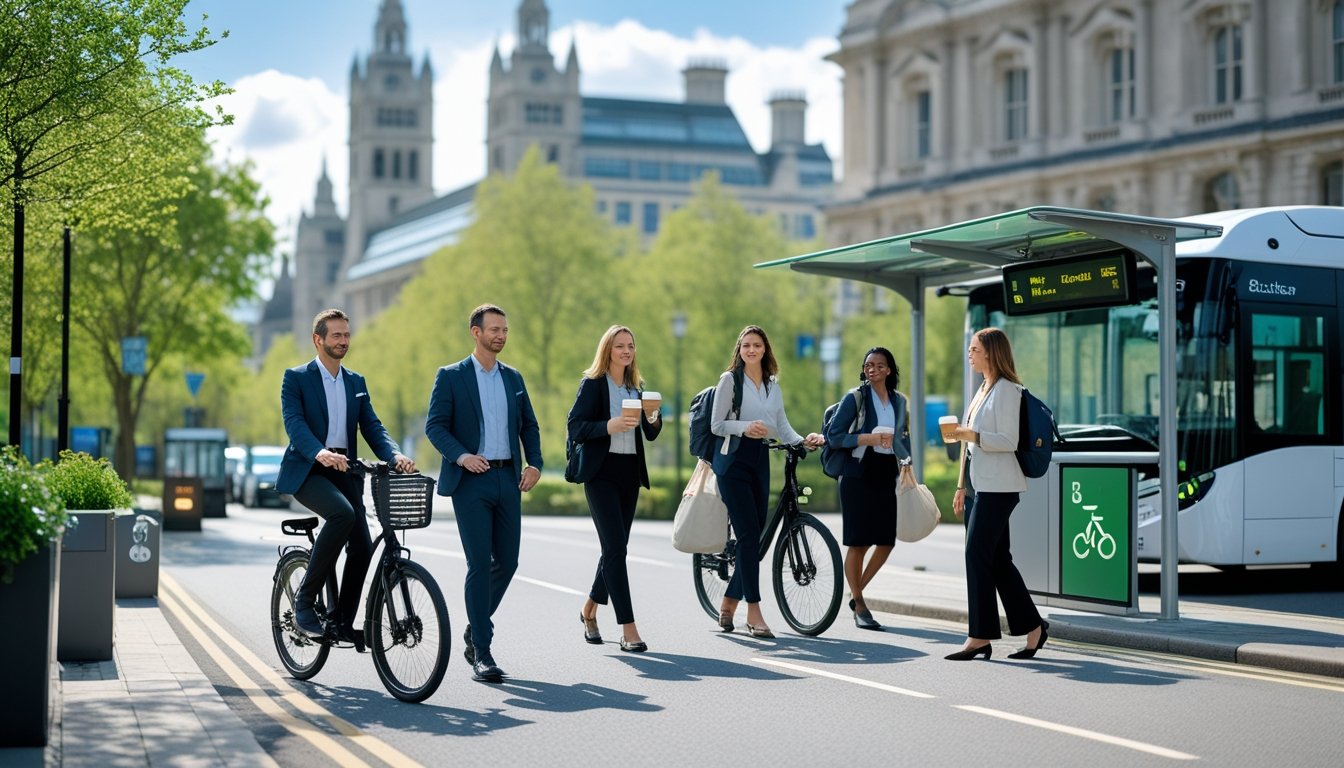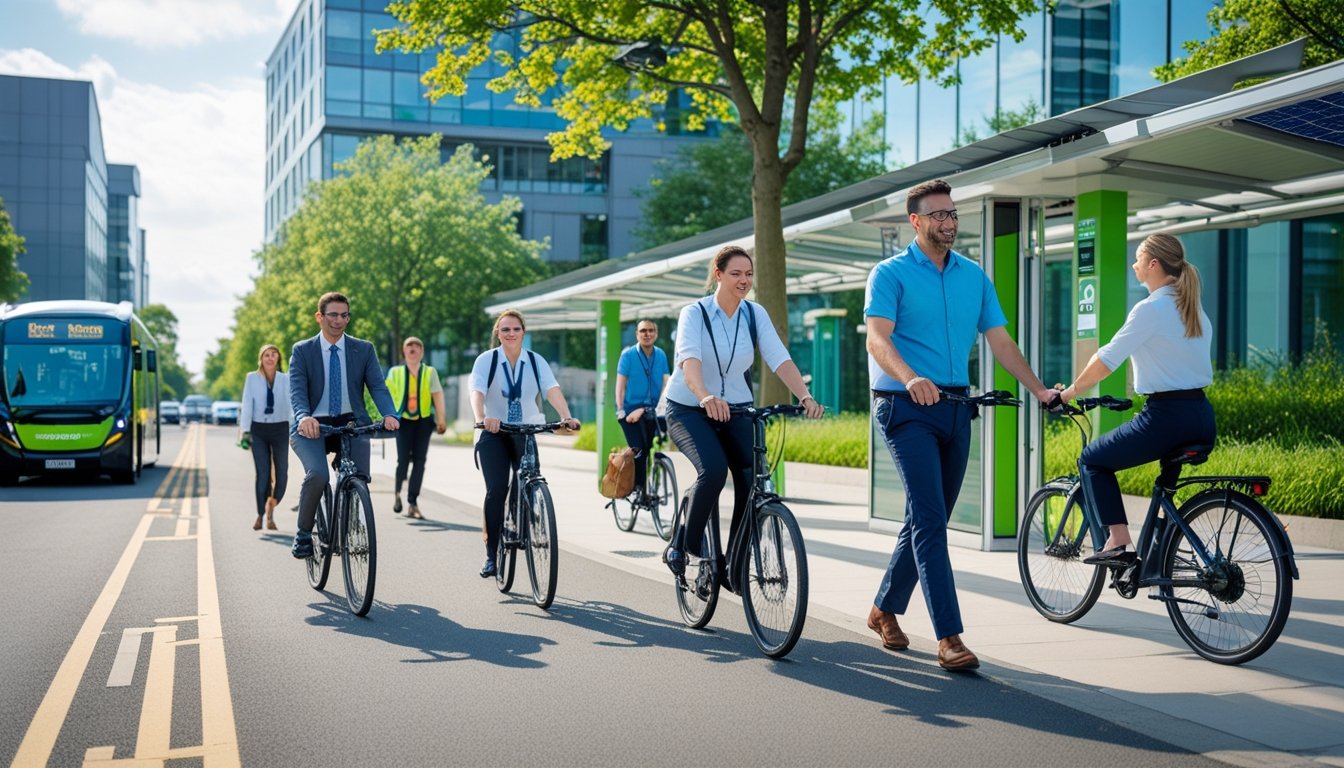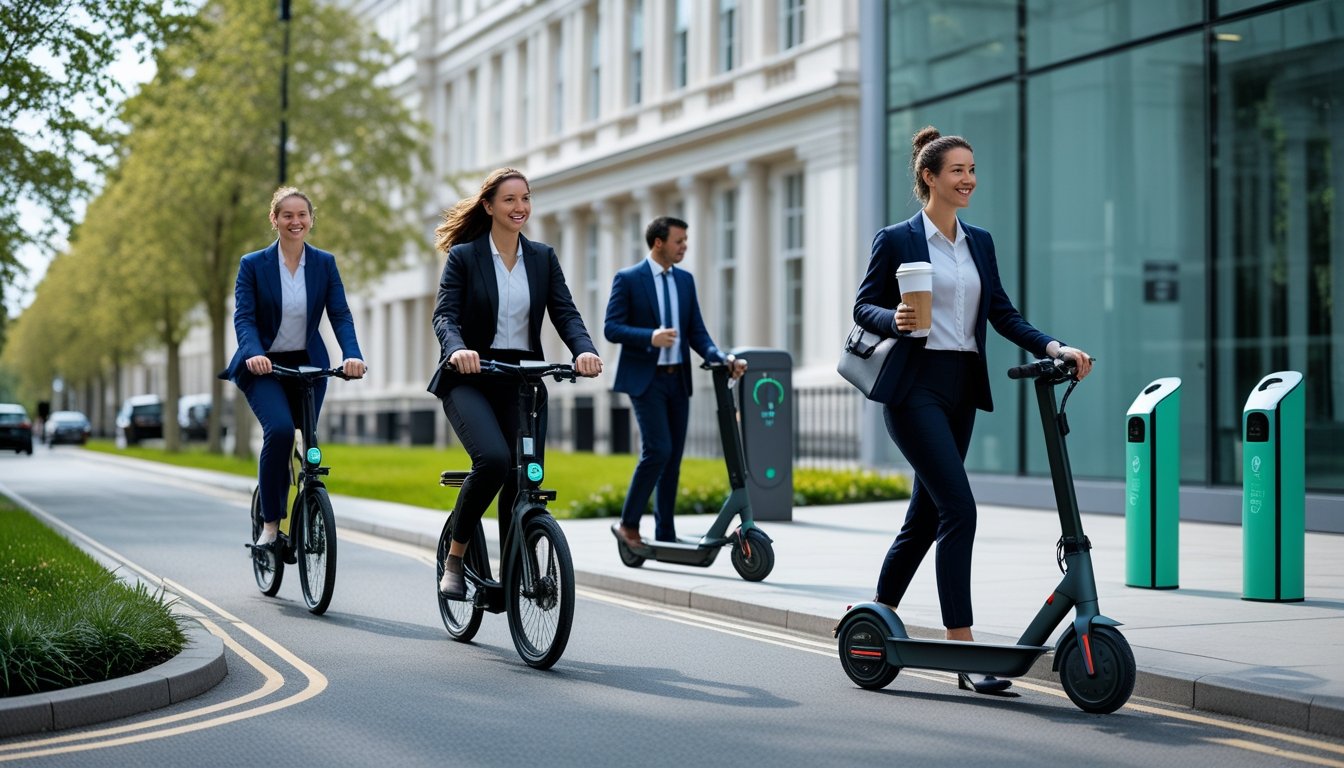Late updated: 16 May 2025 08:05
Written by: Amber Collins
Sustainable Commuting Tips for UK Businesses: Enhancing Eco-Friendly Travel
In an era where environmental responsibility is more important than ever, embracing sustainable commuting solutions can significantly impact our carbon footprint as businesses in the UK. By adopting greener travel practices like cycle schemes and car-sharing, not only do we contribute to climate stability, but we also enhance employee satisfaction and reduce travel costs. Sustainable commuting is the key to fostering a low-carbon, efficient, and appealing work environment.

Integrating practical solutions such as subsidised public transport and remote work arrangements are essential strategies. These steps not only propel us closer to achieving sustainable travel goals but also align with our broader corporate social responsibility objectives. The shift towards sustainability in commuting reflects our commitment to innovation and forward-thinking—a necessity in today's competitive business landscape.
Understanding the tools and technologies available, like teleconferencing and eco-friendly accommodations, helps us navigate these changes smoothly. These innovations position us to lead by example, ensuring our business practices mirror our environmental values. As we explore various strategies, simplicity and creativity will guide our journey towards a more sustainable future.
Key Takeaways
- Sustainable commuting reduces carbon footprint and travel costs.
- Strategies include remote work, cycle schemes, and car-sharing.
- Innovation and technology aid in smooth transitions to greener practices.
Core Strategies for Sustainable Commuting

Businesses in the UK can adopt various strategies to enhance sustainable commuting. Our focus is on promoting cycling and active transport, incentivising public transport use, and implementing flexible and remote working arrangements. These strategies aim to reduce the overall carbon footprint and contribute to achieving net zero goals.
Promoting Cycling and Active Transport
Cycling and walking serve as excellent options for reducing emissions and promoting health. Establishing cycle-to-work schemes can incentivise employees to adopt these forms of transport. We should consider installing bike racks, providing shower facilities, and offering cycling incentives as crucial steps.
Creating partnerships with local authorities to improve cycle paths and pedestrian walkways enhances safety and accessibility. Businesses can also host workshops or provide resources on safe cycling routes. By integrating these elements, we facilitate a shift towards more energy-efficient and low-impact commuting options, aligning with climate change mitigation efforts.
Incentivising Public Transport Use
Public transport offers an efficient way to decrease individual car usage and lower the carbon footprint. We can implement schemes such as subsidised travel cards or shuttle services to encourage employees to choose these sustainable transport options.
Working with local transport providers to improve routes and frequency can make public transport a more attractive choice. Highlighting the benefits of reduced traffic and air quality improvement provides additional motivation. Prioritising public transport aligns with net zero initiatives, supporting businesses in reducing their impact on the environment.
Flexible and Remote Working Options
The adoption of flexible and remote working options allows businesses to cut down on daily commuting emissions significantly. We can implement staggered work hours or remote working policies that reduce peak-time transport congestion.
Investing in digital tools facilitates seamless remote work, thereby minimising the need for physical presence. Reduced travel not only plays a role in energy efficiency but also in promoting work-life balance. Developing these policies is vital for businesses aiming to meet sustainable goals while maintaining productivity.
Innovation and Tools for Sustainable Business Commuting
Fostering sustainable commuting in the UK requires the integration of technology, infrastructure development, and effective design solutions. Key elements include leveraging digital solutions that ease processes and enhance sustainability, as well as designing workplaces that reduce environmental impacts.
Leveraging Technology and Digital Solutions
Digital solutions play a crucial role in fostering sustainable commuting practices. Project management tools like Asana and Trello streamline remote work and allow for efficient virtual collaboration. Platforms such as Zoom and Microsoft Teams support remote meetings, reducing the necessity for physical travel.
Entrepreneurs in London, particularly at places like Thanet House, facilitate innovative tech solutions to manage commuter schedules and optimise travel routes. Mobile apps designed for ride-sharing or public transport updates help minimise carbon footprints. Our consulting services support businesses in adopting these technologies effectively.
Workplace Design and Infrastructure
Strategic workplace design is central to sustainable commuting. Creating facilities that embrace eco-friendly practices is paramount. For instance, bike storage and on-site showers encourage cycling to work. In addition, installing electric vehicle charging points supports the transition to greener vehicle options.
Considering how workspace layout affects commuting can lead to greater compliance with sustainability goals. Open-plan offices and hot desking facilitate flexible working patterns. London entrepreneurs, particularly those in creative districts such as Strand, are leading by example in designing green workspaces. Fostering trust in sustainable commuting initiatives can significantly reduce travel-related risks and emissions.
Frequently Asked Questions

In this section, we will explore practical ways UK businesses can foster sustainable commuting. From implementing flexible work policies to improving onsite facilities, effective strategies and initiatives are available.
What measures can UK businesses take to encourage employees to commute sustainably?
UK businesses can promote sustainability by providing information on local public transport schedules and offering subsidies for public transport passes. Additionally, creating a carpool programme or offering secure bike storage can make a difference. Businesses might also consider fostering a culture of sustainability through employee engagement activities.
Which alternative modes of transportation could be considered eco-friendly for daily commutes in the UK?
Cycling and walking are among the most eco-friendly commute options. Electric vehicles and public transport, such as trains and buses, also offer environmentally friendly alternatives. Encouraging employees to use these modes can significantly cut down on carbon emissions and help meet sustainability goals.
How can UK companies implement flexible working policies to reduce commuting emissions?
By allowing remote work or staggered work hours, companies can decrease office occupancy levels and reduce traffic congestion during peak times. This policy not only cuts down on commuting emissions but also improves work-life balance for employees. Flexible scheduling is a powerful tool in achieving sustainability objectives.
What incentives can businesses offer to staff for using greener commuting options?
Offering financial incentives, like discounts on public transport or contributions toward electric bike purchases, can motivate employees to choose greener commuting options. Recognition programmes or rewards for consistent use of sustainable transport methods can also encourage wider participation.
How might telecommuting contribute to sustainable business practices in the United Kingdom?
Telecommuting significantly reduces the need for daily commutes, leading to lowered emissions and decreased environmental impact. It also diminishes the demand for office space and associated operational costs. By embracing telecommuting, businesses can contribute positively to both sustainability and operational efficiency.
In what ways can improving onsite facilities promote sustainable commuting among UK employees?
Providing showers and changing rooms at work encourages cycling and walking. Designating secure areas for bike parking can make biking a more feasible option for employees. Onsite facilities that support sustainable transport choices play a significant role in fostering a culture of environmental responsibility.
